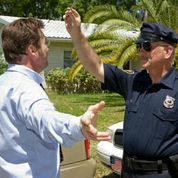The refusal to submit a breath test sample is an oft-contested issue in the state of North Carolina. The determination has proven significant in both the administrative proceeding to determine whether the person’s license will be revoked due to the refusal, and the criminal trial where the refusal may count as evidence of the defendant’s guilt. However, the dilemma is that refusal is not always easy to distinguish, and the collateral estoppel doctrine may be evoked.
in both the administrative proceeding to determine whether the person’s license will be revoked due to the refusal, and the criminal trial where the refusal may count as evidence of the defendant’s guilt. However, the dilemma is that refusal is not always easy to distinguish, and the collateral estoppel doctrine may be evoked.
Administrators of the breathalyzer make the initial opinion as to whether the person has deliberately refused the test. These determinations may later be reviewed by:
- DMV officers while they conduct license-revocation hearings;
- By superior courts reviewing revocation orders;
- By trial courts at the district and superior level to determine whether evidence of refusal is admissible at trial; and finally
- In superior court in jury instruction.
Some lucky DWI offenders are saved by the collateral estoppel doctrine (the issue is precluded from being heard more than once in a civil matter), and therefore, the courts are precluded from reconsidering another court’s ruling on the issue of refusal. However, sometimes it may be permissible for an issue to be considered a second time.
In State v. Summers (1996), a very important DWI case in North Carolina, the DMV ruled that a defendant did not willfully refuse a chemical analysis, and therefore, the issue of refusal may not be re-litigated in the defendant’s criminal trial. This also evokes the criminal version of collateral estoppel, the Double Jeopardy Doctrine, stating that an offender cannot be tried twice for the same criminal act. The reason being that some of these hearings are punitive, rather than simply civil.
However, according to Brower v. Killens (2000), a later case, when the DMV determines administratively that the defendant did NOT willfully refuse a chemical analysis, a trial court MAY reconsider that issue for the purposes of the criminal trial. The reasoning behind this supposition is that both the DMV and the district attorney represent interests of the State, and it has been determined that administrative hearings do not adequately protect the interests of the District Attorney. So, in short the collateral estoppel doctrine did not apply here as it did in Summers.
In a May, 2013 opinion, however, the NC Appellate Court added one more circumstance to the “no-collateral bar” rule. This opinion stated that a Superior Court, who is retrying a defendant subsequent to a mistrial in Superior Court, is not bound by the earlier courts ruling on the issue regarding refusal of the breath-test. In this decision, during the trial that led to the appellate court appearance, the jury was not instructed that the refusal to partake in the breath-analysis may prove to be evidence of the woman’s guilt.
Thereafter, a mistrial was acknowledged when the jury could not reach a verdict, and the defendant was forced to be retried in front of another superior court judge. Here, it was determined that the refusal instruction was warranted and it was delivered to the jury, who found that the defendant was ultimately guilty of impaired driving. Therefore, the moral of the story was that the judge was NOT bound by jury instruction rulings made during a first Superior Court trial.
Here, the law seems to be moving in the favor of allowing the issue to be heard more than once in certain circumstances. In Summers, the decision was more in favor of not deciding the claims again; however, since Browers in 2000, the courts in North Carolina seem to be moving toward allowing re-litigation in some scenarios, especially when an administrative hearing is involved. Another of these issues is that, if evidence is not presented properly during the first trial in Superior Court, a mistrial will be determined, and Superior Court can hear litigation on the claim again.